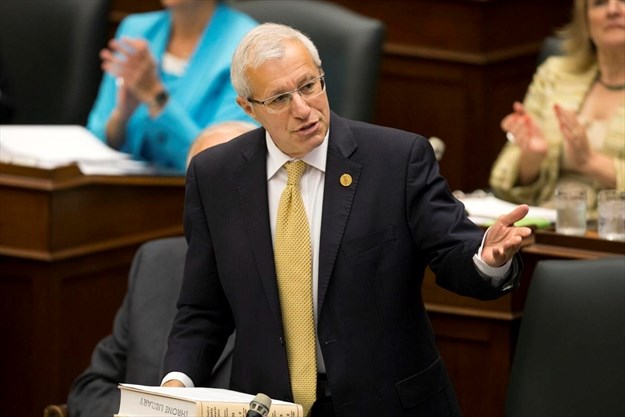Ontario won’t work with illegal pot shops

The operators of illegal pot stores may be in for a rude awakening if they hope to transition into legitimate businesses after cannabis is legalized.
Ontario Finance Minister Vic Fedeli has warned the province won't "want to do business with people running an illegal business" when marijuana becomes legal on Oct. 17.
And even former storefront vendors who bailed out of the unlawful trade could be blacklisted.
Ontario is still conducting public and community consultation regarding the framework for its private retail stores.
But Jason Thorn, Hamilton's general manager of planning and economic development, notes no illegal dealers will qualify for licences if the Ford government follows the "Alberta model" when it launches its retail cannabis stores on April 1, 2019.
Alberta has decided that applicants who are or once were in the illegal cannabis trade, including retail or medical sales, won't be eligible for a retail licence.
Thorn also notes existing illegal storefronts in Hamilton will still be taboo after Oct. 17. The only legal way to acquire marijuana prior to the opening of the provincially-regulated retail stores will be online through the province's Ontario Cannabis Store.
Thorn's comments were sparked by a motion from Coun. Judi Partridge directing staff to prepare a report on cannabis stores for the new council to be elected on Oct. 22.
The report is intended to outline possible regulations the city could impose on the licensed outlets and review the one-time opt-out clause the province is giving city councils if they choose not to allow them in their municipalities.
The province has already signalled that new councils will have to make a quick decision whether to approve the stores in order for them to be up and running by April.
If Hamilton council rejects bricks-and-mortar outlets, pot smokers will still be able buy marijuana from the government online store, which will continue to operate after the retail shops are up and running.
The likelihood of the province preventing existing illegal storefronts from becoming legit will be a downer for those vendors who figured they had a foot in the door. But in many ways, it's pure poetic justice.
For some two years, Hamilton police and bylaw enforcement officers have been fighting a losing battle with the so-called dispensaries, which began springing up in increasing numbers after the Trudeau government announced it would be legalizing and regulating the use of recreational pot.
In many cases masquerading as caring purveyors of cannabis for medical purposes, the illegal outlets have thrived in the grey area cast by the pending new law, which will make possession of small amounts of marijuana legal for those 19 and older.
Trying to control the illegal operations has been an exercise in frustration.
The city's bylaw department has issued scores of zoning charges and licensing tickets. Police have spent long hours getting search warrants and conducting investigations.
Meanwhile, dozens of stores have closed, dozens more have opened elsewhere. Bylaw fines, ranging from $500 to $2,000, are largely laughed off. Police charges languish in the courts.
Come Oct. 17, things will be different. The law will start baring its fangs.
Individuals, including landlords, convicted of the unlawful sale and distribution of marijuana face fines of up to $250,000 and imprisonment of up to two years less a day.
Upon first conviction, companies will be looking at fines of at least $25,000 and up to $1 million. Subsequent convictions will bring fines ranging from $10,000 to $500,000 for each day of offence.
City licensing director Ken Leendertse notes legalization won't have much impact on bylaw enforcement, but it will strengthen the hand of police. "When the provincial legislation comes down, it should give significant teeth to force closure because you're going right after the profits."
The cold truth is, once marijuana becomes a regulated narcotic, illegal dope dealers won't just be breaking the law, they'll be seen as rogue competitors challenging the government's monopoly and threatening its revenue.
Neither the feds nor the province will stand for that.
420 Intel is Your Source for Marijuana News
420 Intel Canada is your leading news source for the Canadian cannabis industry. Get the latest updates on Canadian cannabis stocks and developments on how Canada continues to be a major player in the worldwide recreational and medical cannabis industry.
420 Intel Canada is the Canadian Industry news outlet that will keep you updated on how these Canadian developments in recreational and medical marijuana will impact the country and the world. Our commitment is to bring you the most important cannabis news stories from across Canada every day of the week.
Marijuana industry news is a constant endeavor with new developments each day. For marijuana news across the True North, 420 Intel Canada promises to bring you quality, Canadian, cannabis industry news.
You can get 420 Intel news delivered directly to your inbox by signing up for our daily marijuana news, ensuring you’re always kept up to date on the ever-changing cannabis industry. To stay even better informed about marijuana legalization news follow us on Twitter, Facebook and LinkedIn.




